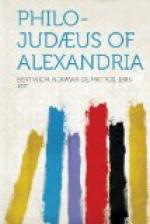The prosperity and privileges of the Jews, combined with their peculiar customs and their religious separateness, did not fail at Alexandria, as they have not failed in any country of the Diaspora, to arouse the mixed envy and dislike of the rude populace, and give a handle to the agitations of self-seeking demagogues. The third book of the Maccabees tells of a Ptolemaic persecution during which Jewish victims were turned into the arena at Alexandria, to be trodden down by elephants made fierce with the blood of grapes, and of their deliverance by Divine Providence. Some fiction is certainly mixed with this recital, but it may well be that during the rule of the stupid and cruel usurper Ptolemy Physcon (c. 120 B.C.E.) the protection of the royal house was for political reasons removed for a time from the Jews. Josephus[16] relates that the anniversary of the deliverance was celebrated as a festival in Egypt. The popular feeling against the peculiar people was of an abiding character, for it had abiding causes, envy and dislike of a separate manner of life; and the professional anti-Semite,[17] who had his forerunners before the reign of the first Ptolemy, was able from time to time to fan popular feelings into flame. In those days, when history and fiction were not clearly distinguished, he was apt to hide his attacks under the guise of history, and stir up odium by scurrilous and offensive accounts of the ancient Hebrews. Hence anti-Jewish literature originated at Alexandria.
Manetho, an historian of the second century B.C.E., in his chronicles of Egypt, introduced an anti-Jewish pamphlet with an original account of the Exodus, which became the model for a school of scribes more virulent and less distinguished than himself. The Battle of Histories was taken up with spirit by the Jews, and it was round the history of the Israelites in Egypt that the conflict chiefly raged. In reply to the offensive picture of a Manetho and the diatribes of some “starveling Greekling,” there appeared the eulogistic picture of an Aristeas, the improved Exodus of an Artapanus. Joseph and Moses figured as the most brilliant of Egyptian statesmen, and the Ptolemies as admirers of the Scriptures. The morality of this apologetic literature, and more particularly of the literary forgeries which formed part of it, has been impugned by certain German theologians. But apart from the necessities of the case, it is not fair to apply to an age in which Cicero declared that artistic lying was legitimate in history, the standard of modern German accuracy. The fabrications of Jewish apologists were in the spirit of the time.




